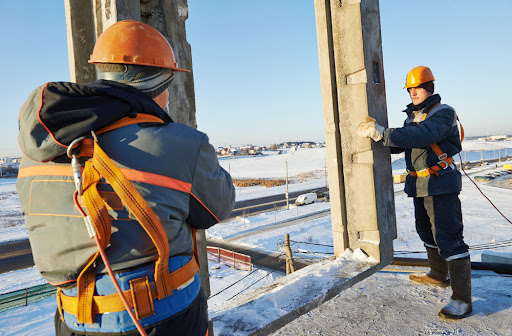As a construction site manager or business owner, you know that it’s sometimes necessary to continue working into the winter season to stay on track. Unfortunately, as temperatures begin to fall, frostbite is more likely to occur on your construction site, and your employees will start to ask you how to stay warm in winter construction. Here are four crucial tips to follow to protect yourself and your team at a frigid construction site, as well as an overview of frostbite.
Understanding Frostbite
Frostbite is a condition in which the tissue on or just below the surface of the skin begins to freeze. It occurs because the blood vessels present in areas exposed to the cold start to constrict and no longer deliver blood cells to those areas. However, the lack of oxygen and nutrients the blood normally carries damages the cells, resulting in frostbite.
Depending on how deep the frostbite reaches, it can cause different severities of damage.
- The first stage, and least damaging, is known as frostnip, which can incur numbness in affected areas but won’t lead to any permanent skin damage.
- In the intermediate stage, known as superficial frostbite, your skin can feel hard and warm. When your skin thaws and returns to a normal temperature, blisters filled with fluid may develop.
- During deep frostbite, every layer of skin and the tissues underneath it become hard and lose their sense of pain and cold. As a result, you may not realize you have this advanced frostbite before it is too late. Afterward, the affected skin will turn black or blue and then die.
Anyone who works outside during the winter months is at risk of developing frostbite, and severe cases of advanced frostbite may even require hospitalization due to the dying cells. Knowing how to stay warm in winter construction sites will protect you from these painful and severe conditions.
Preventing Frostbite at Your Construction Site
There are four vital steps that you can take to keep your employees safe from frostbite this winter. Use these four tips to enjoy a safer winter season for everyone on your site by preventing frostbite:
Know the Signs
Knowing the symptoms of frostbite is the first step to taking action if someone is hurt. Some of the most common signs of frostbite include rigid muscles, pale skin that’s cold to the touch, and hard, white skin tissue — particularly on the hands, nose, and cheeks.
Before the weather grows cold enough for frostbite conditions, conduct a meeting with your employees to educate them on the signs of frostbite and how to stay warm during winter construction.
Use a Buddy System
It can be difficult for someone to recognize on their own that they’re suffering from hypothermia or frostbite, as the damaged cells that normally warn them of pain or low temperatures become damaged. Assign each of your employees a “buddy” to check in on them regularly so they can spot one another and inform the other of any symptoms they notice.
Insist on Warm Gloves and Apparel
The fingers are one of the most common areas for frostbite to develop. Provide workers with insulated gloves to wear while working outside, as they’ll be using their hands frequently throughout the day. Construction clothing manufacturers now make gloves with insulation and enough dexterity to allow employees to operate everything from blasters to used hydraulic breakers, so there’s no excuse to skip protection.
Further, toes are similarly at risk for frostbite, so ask your employees to wear warm socks and insulated boots to protect their feet. Heads are another part of the body that must be protected from the cold, as heat can escape there easily, and your face can also suffer from frostbite. Telling employees to don warm hats and scarves can help reduce the chill their heads may experience.
Encourage Employees to Layer Clothing
When it comes to winter dress, less definitely isn’t more. Encourage employees who ask how to stay warm in winter construction to wear multiple layers of clothing when they come to work to stay warmer. Your employees should come to the construction site wearing the following layers of clothing:
- The base layer consists of warm socks and underwear capable of wicking moisture and sweat. Staying dry is vital for preventing frostbite, as becoming wet will lower body temperatures so that moisture-wicking clothing will be a valuable and comfortable shield.
- Next, the second layer should be a more breathable layer for insulation. A thin jacket will help prevent the heat that bodies naturally produce from escaping and going to waste.
- Lastly, your employees should bundle in a protective outer layer to prevent the harsh winter winds and snow from lowering their temperature. Additionally, the coat on the outer layer should be waterproof to prevent your team from becoming wet.
As a construction leader, you need to know that your employees are safe at work. Are you putting your employees at risk by using old, worn-out, or broken tools on your job site? Replace your tools with affordable Atlas Copco hydraulic breakers, CAT hydraulic hammers, new jackhammer parts, and more from the team at Hydraulic Breaker Services. Give us a call today to learn more or get a free quote.

















